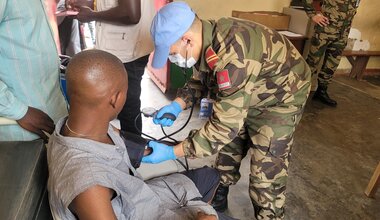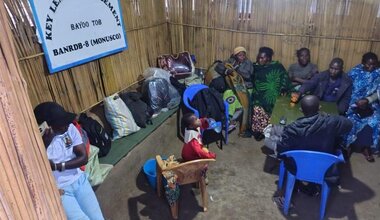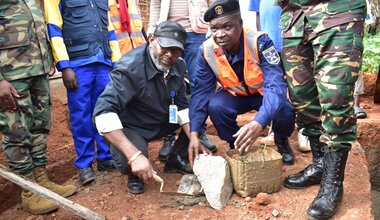MONUSCO activates Quick Reaction Force to protect civilians in Masisi
Photo: MONUSCO/RSA
Goma, 5 October 2011 - Two attacks on civilians by unidentified armed men took place in the Masisi territory, Nord-Kivu province, on 30 September. The first one occurred in the village of Kitchanga, 80 km north-west of Goma, and the second in the village of Karto on the road between Mweso and Kitshanga. Alerted to these incidents, the United Nations Organization Stabilization Mission in the Democratic Republic of Congo (MONUSCO) launched its Quick Reaction Force from the South African contingent against the attackers.
In the first attack, which took place some three kilometers from Kitchanga, a humanitarian team from the Non-Governmental Organization Premières Urgences et Aide, travelling aboard two vehicles was ambushed by three unidentified armed men in military uniform. The attackers sprang out from the high bushes and fired at the vehicles. One vehicle was hit, but managed to escape before breaking down only a few miles away. However, the second vehicle was stopped, and its passengers stripped of all their belongings. Minutes later, the South Africans were on the scene, causing the carjackers to vanish into the lush green nature.
In the second incident, which occurred in the afternoon, unidentified gunmen opened fire on a vehicle belonging to the North Kivu government agency for the management of camps of internally displaced people (IDPs). This incident took place in Karto village on the Mweso-Kitshanga road on the other side of the Masisi territory.
In both incidents, no loss of life was deplored.
When asked about this double attack, Colonel Albert Makgae of the South African contingent said his men were dead ready to protect the civilian population in the face of any threats, and this, he stressed, in accordance with MONUSCO's mandate. "The South African contingent of MONUSCO will always be there for the citizens of the DRC," he concluded.
 UN
UN United Nations Peacekeeping
United Nations Peacekeeping







